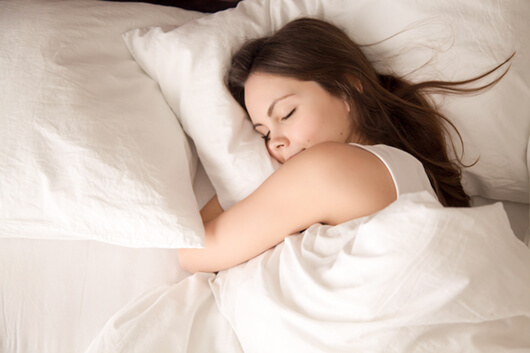
We all know how lousy we feel when we don’t get a good night’s sleep. Sleep deprivation affects our entire day, leaving us fatigued, grumpy, and fuzzy headed. When constant tossing and turning disrupts our circadian rhythm, we are simply not able to function at top capacity.
Why is sleep important? Getting quality sleep impacts our overall wellness. And there are several methods we can turn to in order to achieve restorative sleep. These are simple lifestyle adjustments that, when used together, can really make a positive difference in the quality of sleep we experience.
The Circadian Rhythm
Sleep disorders are often the result of an out-of-kilter circadian rhythm. Finding new ways to recalibrate this important system and achieve sound sleep should be a top priority. The circadian rhythm refers to an internal clock that keeps us alert during the day and feeling sleepy at night. This shift occurs due to our cortisol levels being dominant during the day and melatonin levels dominant during the nighttime.
When the circadian rhythm is thrown off, possibly due to an ever-changing sleep schedule or chronic stress, we pay the price in several ways. Poor sleep is associated with a myriad of health issues as well as mental health conditions. These adverse health effects include:
- Higher risk of depression or anxiety disorder
- Hypertension
- Obesity
- Heart disease
- Dementia
- Reduced immunity
- Irritability, short temper
Medications prescribed for sleep disorders can be problematic, as they have highly addictive properties. In recovery, these drugs are simply not an option. Instead, seeking natural remedies is the better course of action in the quest to achieve a good night’s sleep.
Four Benefits of Sleep
It might be surprising to learn how important quality sleep is to our health and wellbeing. Consider these four benefits of getting good sleep:
- Better Health. Sleep enhances many of our basic body systems, including boosting our immune response, regulating blood sugar levels, and allowing the heart to rest.
- Sharper Mind. Getting quality sleep helps us think more clearly, and also helps with short-term memory.
- Controls Weight. Lack of sleep can impact the balance of the hormones leptin and ghrelin, which regulate appetite.
- Improves Mood. When we don’t get enough sleep we produce less serotonin, a neurotransmitter that helps regulate mood. This can make us more susceptible to depression.
Five Ways to Improve Sleep
The key to achieving better sleep quality is through finding healthy ways to increase relaxation at bedtime. Fortunately, there are several natural alternatives to dangerous sleep medications. Practice these five tips to safely improve your sleep quality:
- Guided Imagery. Smartphone apps, like Pzizz and Relax Now, offer guided imagery tracts during which a narrator provides verbal cues and sound effects to conjure up a calming scenario. This is practiced along with slow, quiet breathing to bring about a sense of peacefulness.
- Aromatherapy. Essential oils, such as bergamot, lavender, rose, and ylang ylang, have relaxation properties. Consider adding some drops to a warm bath, placing a few drops of lavender on your pillow, or using with a diffuser before bedtime.
- Supplements. There are several herbal supplements that may help promote better sleep quality. These include melatonin, valerian root, L-theanine, GABA, and ashwagandha. A nice cup of chamomile tea can also be relaxing before bed.
- Progressive Muscle Relaxation. Deep muscle relaxation can help you get to sleep. Focus your attention on each group of muscles, one group at a time, from the feet up. Tense the muscle while inhaling, hold for a count of five, and then exhaling while releasing the tension in the muscle.
- Practice Mindfulness. Mindfulness is a type of meditation that guides your thoughts towards the sensations being experienced in the moment. This trains your mind to avoid distracting or stressful thoughts and to focus instead on the present.
Other practical bedtime habits would include keeping a regular sleep schedule, avoiding heavy meals after 7:00 p.m., limiting caffeine intake during the day, and powering off your electronic devices an hour before bedtime.
Ashley Addiction Treatment, formerly Father Martin’s Ashley, is a nationally recognized nonprofit leader in integrated, evidence-based treatment for substance use disorders and is accredited by The Joint Commission. We offer both inpatient and outpatient programs, holistic addiction treatment, drug detox, relapse prevention plans, family wellness programs and a variety of other services tailored to each patient’s needs. Our driving principle — “everything for recovery” — reinforces our mission to heal each individual with respect and dignity, and reflects on our ongoing commitment to meet new challenges. For information about our comprehensive programs, please call (866) 313-6307.
